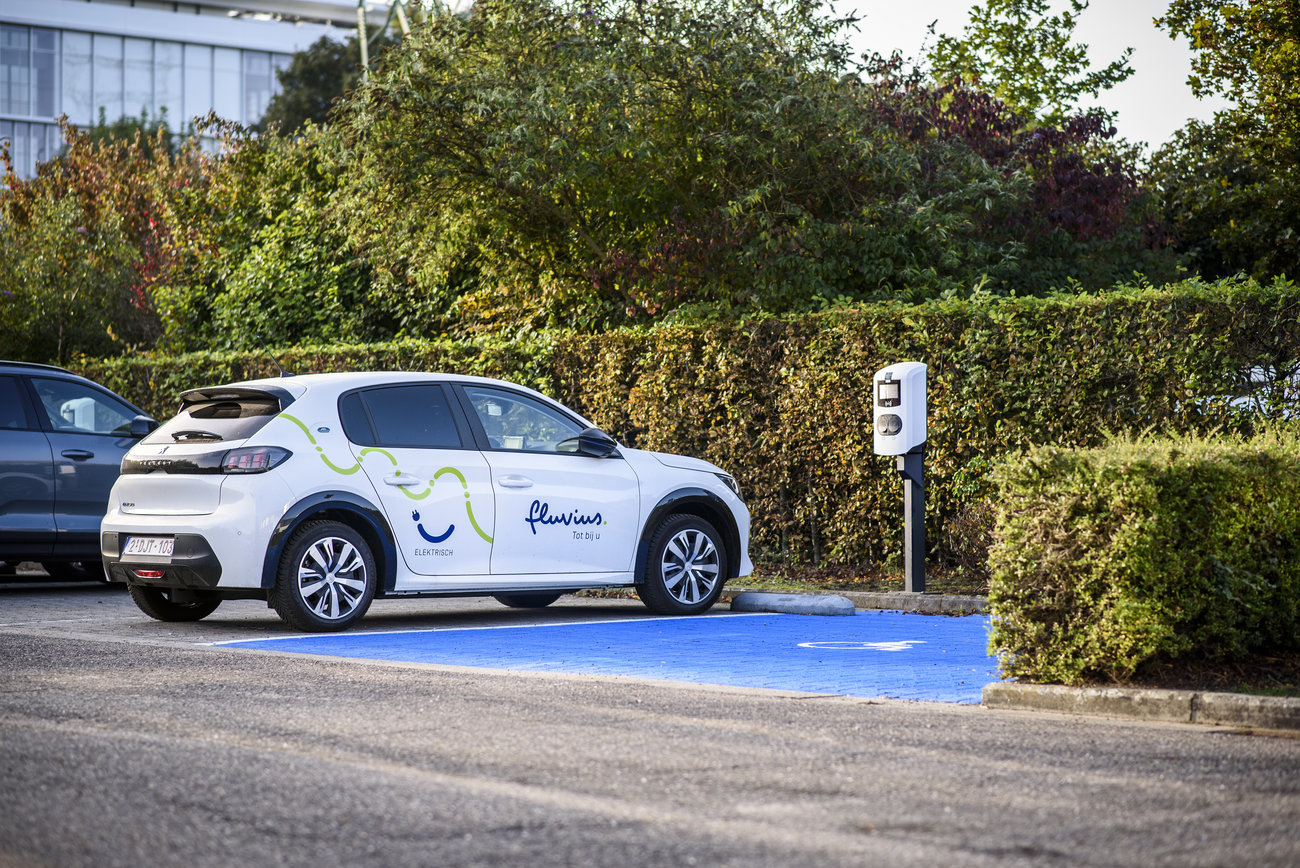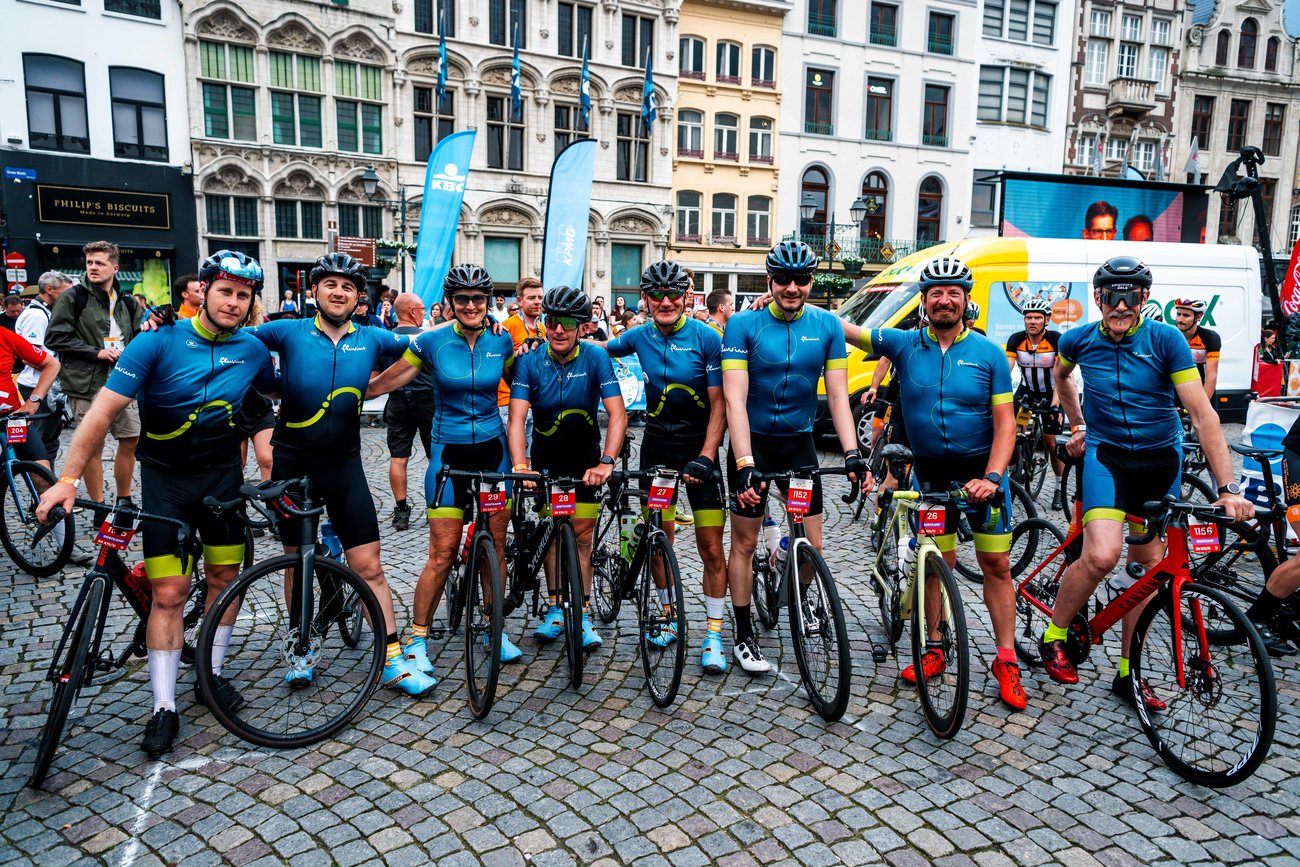
Focus on connecting
Corporate social responsibility (CSR) is woven into our policy. It means that we can make an ecological and social contribution to society in general and to various interest groups in particular.
Ecological project
Our environmentally focused activities are mainly in sustainable mobility and various 'Green Deals'. These are voluntary agreements between (private-sector) partners and the Flemish government to achieve specific environmental objectives together. In the area of sustainable mobility, we are focusing intensively on electric driving, according to the principle of Electric First.
Electric First: the choice for sustainable mobility

We have been pursuing an Electric First policy for our company vehicles for some years now. We are replacing existing petrol and diesel vehicles with the most environmentally friendly alternative available at the time. If a fully electric model meets the needs in terms of range or load capacity, then it's our first choice.
In recent years, we have replaced several hundred petrol and diesel-powered company vehicles – including leased vehicles – with fully electric, plug-in hybrid or compressed natural gas (CNG) models. Over the coming years, we will be renewing around 800 company vehicles in total in this way. The decision to go ‘as green as possible’ and ‘electric as much as possible’ means an eventual saving of more than 1 million litres of fossil fuels a year.
For our company cars, we have made the switch to fully electric cars. Since 1 July 2023, only electric company cars can be ordered. In addition, we now offer our executives the possibility to participate in the mobility budget.
We have also taken the first steps for our service vehicles. Our goal is to emit 25% less CO2 from our vans and trucks by 2030 and to offer an electric alternative whenever possible. In this regard, we take into account the function and tasks of our directors and the market supply. We are working towards a roadmap 2030, and electrifying a portion of our service vehicles.
From the renewed model of waste & circular materials management, a selection of projects have been started to selectively recollect (waste) material streams for further disassembly, and greater reuse as a material or raw material. In collaboration with contractors and social integration companies, this was continued in 2023.
Processing public lighting (OV) fixtures via a social integration company
Circular materials can be reused multiple times and eventually broken down in an environmentally friendly way. One example is obsolete public lighting fixtures. Via our contract, we were authorised to gradually process the waste stream of obsolete lighting fixtures ourselves, applying the principle of circular economy.
Back in 2021, the local social integration company W-Technics in Zele conducted several pilot tests dismantling these lighting fixtures. Thanks to improved sorting at the source, the company ensures a purer recycling and waste stream. In 2023, 168 tons of fixtures were dismantled using this process.
For other composite materials, such as low-voltage cabinets and meter and battery assemblies, this process is also being commenced across the board.
Circular processing of safety shoes and boots
The circular processing of safety shoes and boots is organised via our partner Circular Footwear Alliance. In 2023, 1,800 shoes were collected for further processing.
Sustainability Competence Centre
Our organisation has signed a Corporate Social Responsibility (CSR) charter. This means that we are guided, among other things, by the principles of socially responsible procurement (SRP) when purchasing work materials, goods, services and ICT. Examples of these principles include sustainability and social justice. We screen and assess (prospective) suppliers in terms of ecological and social considerations. When selecting and awarding companies for procurement contracts, we take these criteria into account whenever possible.
To put this procurement policy into practice, we set up a Sustainability Competence Centre (CCD). This is where we collect and share as much expertise as possible in the area of sustainability and how to integrate it into a procurement contract. The CCD takes these five focus areas into account:
- Positive ecological footprint
- Local growth
- Respect for working conditions
- Social economy
- Circular purchasing
In 2022, the CCD welcomed Fluvius' CSR coordinator as a new member. In addition to additional knowledge sharing, there is now a stronger link with the Fluvius CSR Board. Based on this broader cooperation, the CCD has also collaborated on projects relating to, for example, EU Taxonomy and the European Investment Bank. In the coming years, we will focus even more on these themes as well as on the UN Sustainable Development Goals (SDGs), namely sustainable procurement and our own CO2 footprint.
In 2023, we embedded our CSR commitment even more 'upstream' in the Fluvius procurement policy. For example, the CCD actively participates in the Procurement Planning Forum, identifying procurement dossiers that may have a substantial impact on our CSR ambitions. In those pilot dossiers, for example, we can impose CSR selection and award criteria in the sourcing process, or incorporate Ecovadis scores in the implementation phase.
Double materiality assessment CSRD
The new European Corporate Sustainability Reporting Directive (CSRD) requires organisations to conduct a double materiality assessment as an important first step. Through this approach, sustainability is looked at from two perspectives: the 'impact' materiality, or how does a company impact the environment and society; and the 'financial' materiality, which looks at what financial impact sustainability topics have on a company. Fluvius will prepare its annual report in accordance with the new CSRD guidelines starting in financial year 2024. You can already find out about the results of our 2023 double materiality assessment as we continue our commitment to a sustainable future.
Fluvius’ good causes
Back in the day, Fluvius selected two good causes with whom it could set up long-term structural cooperation. We will continue this positive cooperation in 2023.
“Pleased that we were able to donate 16,587 meals to the Food Banks and to donate 89,500 euros to Kom op tegen Kanker ('Stand Up to Cancer') from Fluvius together with numerous initiatives.”
Guy De Munck, responsible of Fluvius' Good Causes

Education and training
Because we believe training and development are very important, we cooperate closely with the education sector. As well as traineeships, we also offer dual learning for students from specific disciplines. At the annual ‘Spitsdagen’ (Top Days), the various education-sector players get to know our organisation and each other better. Additionally, we make our internal training offering available to partners and contractors.
Dual learning
We organise a combination of education and work experience in the form of a dual learning course. For the 2023-2024 academic year, we started with nine students, five of whom found a workplace at Fluvius and four were accommodated by our contractors.
Traineeships
For the 2023-2024 school year, we set out to increase the number of traineeships in technical graduate and undergraduate programmes. There are ten technical graduate and undergraduate traineeships running this year – the highest number in five years. The number of TSO traineeships remained roughly stable, with 22 trainees.